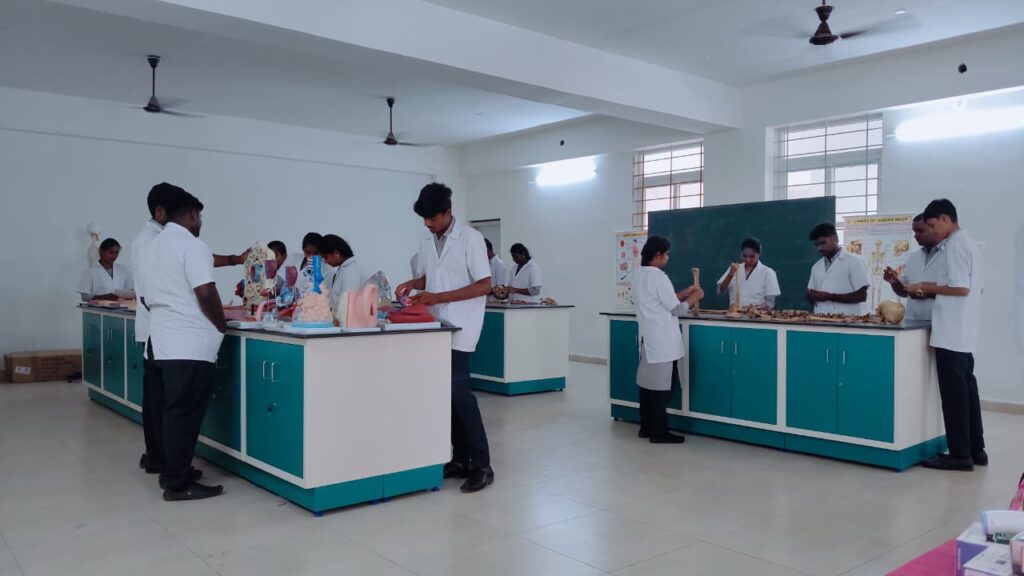To be a center of excellence in Physiotherapy education, research, and clinical practice, nurturing compassionate professionals with integrity and innovation.

(Affiliated to The Tamil Nadu Dr. M.G.R Medical University, Chennai)
Fields:
Physiotherapy, also known as physical therapy, is a vital healthcare profession that focuses on restoring movement and function when someone is affected by injury, illness, or disability. It emphasizes a holistic approach to health and wellbeing, including prevention, diagnosis, and therapeutic management of physical dysfunction.
Physiotherapists are trained professionals who utilize a variety of techniques such as manual therapy, exercise prescription, electrotherapy, and patient education to improve mobility and quality of life.
The origins of physiotherapy date back to ancient civilizations such as Greece and China, where techniques like massage and exercise were used for healing purposes. The modern profession developed significantly after World War I and II, where physiotherapists played a crucial role in the rehabilitation of injured soldiers. Over the years, it has evolved with advancements in medicine, technology, and rehabilitation sciences.
Physiotherapy is grounded in the belief that movement is essential to health. Its primary goals include:
Physiotherapists work with people of all ages and in various settings, from hospitals and clinics to sports arenas, schools, and community centers.
Physiotherapy encompasses several specialized branches, each focusing on specific patient populations or health conditions. The major branches include:
Focuses on the assessment and treatment of musculoskeletal disorders such as:
Orthopedic physiotherapists use manual therapy, therapeutic exercises, taping, and modalities like ultrasound and TENS.
Deals with disorders affecting the brain, spinal cord, and nerves. Conditions treated include:
Treatment involves neurodevelopmental techniques, balance and gait training, and functional retraining.
Specializes in patients with heart and lung conditions such as:
Techniques include breathing exercises, chest physiotherapy, aerobic conditioning, and endurance training.
Targets infants, children, and adolescents with developmental, neuromuscular, or skeletal issues like:
Therapy focuses on motor skills development, play therapy, posture correction, and parent education.
Aims at improving the health and independence of older adults by addressing issues like:
Interventions include strengthening, mobility training, fall prevention, and pain management.
Caters to female-specific conditions such as:
Emphasizes pelvic floor strengthening, posture correction, and core stability.
Focused on athletes and sportspersons, managing:
Includes sport-specific training, injury prevention, taping, and biomechanical analysis.
Deals with promoting health and mobility at a community level, especially among:
It often involves outreach, awareness programs, and preventive health education.
Specialized in conditions affecting the hand and upper extremities including:
Emphasizes splinting, dexterity exercises, and fine motor coordination.
Addresses physical challenges faced by cancer patients such as:
Involves gentle strengthening, endurance training, and functional rehabilitation.
To become a physiotherapist in India, one must complete the Bachelor of Physiotherapy (BPT), a four-and-a-half-year undergraduate course including clinical internships. Further specialization is available through Master of Physiotherapy (MPT) in areas like Orthopedics, Neurology, Pediatrics, Sports, etc. Continuing education and certifications help professionals stay updated with the latest practices.
With an aging population, rise in lifestyle diseases, and increased awareness of preventive healthcare, the demand for physiotherapists is growing worldwide. Countries like Canada, Australia, UK, UAE, and the USA offer lucrative opportunities for qualified physiotherapists.
Many countries recognize Indian physiotherapy degrees, though licensure exams and local certifications may be required for practice.
Physiotherapy has embraced technology in the form of:
These advancements help personalize treatment and make rehabilitation more effective and engaging.
Physiotherapy is more than just a rehabilitation science—it’s a bridge to functional independence and better quality of life. Whether helping a child walk, an athlete recover from injury, or an elderly person regain mobility, physiotherapists play a crucial role in society. With its multiple branches, evolving techniques, and global demand, physiotherapy stands as a dynamic and rewarding profession with immense potential to impact lives.
Physiotherapy is a dynamic healthcare profession aimed at promoting mobility, functional ability, and overall well-being. It plays a critical role in rehabilitating individuals affected by injury, illness, aging, or disability. The field focuses on evidence-based physical techniques such as manual therapy, exercise prescription, electrotherapy, and functional training. With a blend of science and compassion, physiotherapy is increasingly recognized as a crucial part of preventive and rehabilitative healthcare worldwide.
To start a career in physiotherapy, aspirants must complete a Bachelor of Physiotherapy (BPT). This undergraduate program generally spans four and a half years, including a six-month clinical internship. The curriculum covers subjects like anatomy, physiology, biomechanics, pathology, exercise therapy, electrotherapy, and clinical placements in various departments like orthopaedics, neurology, cardiopulmonary, and community health.
After completing BPT, those looking for specialization can pursue a Master of Physiotherapy (MPT) in areas such as:
Students interested in academics or research can further pursue Ph.D. programs. Throughout their career, physiotherapists are encouraged to engage in continuous professional development through workshops, certifications, and conferences.
A successful physiotherapist must go beyond academic learning. Key skills to develop include:
Additional certifications in manual therapy, dry needling, kinesio taping, pelvic floor therapy, and fitness training can greatly enhance employability and professional credibility.
Tamil Nadu is one of the leading states in India for healthcare and education. It houses numerous medical colleges, physiotherapy institutions, and rehabilitation centres. With growing awareness about physical wellness and rehabilitation, the demand for physiotherapists has surged across urban and semi-urban areas.
Physiotherapists in Tamil Nadu can work in:
The state’s focus on public health infrastructure and the availability of educational institutions ensures steady job opportunities for both fresh graduates and experienced professionals.
Physiotherapy is gaining wider recognition across India due to its role in injury prevention, chronic disease management, and post-operative rehabilitation. There is an expanding scope in both urban hospitals and rural health centres.
Physiotherapists in India can pursue careers in:
With increasing integration of technology in healthcare, physiotherapists are also being employed in roles involving wearable device development, posture analysis apps, and AI-based movement tracking systems.
Physiotherapy is a globally respected profession. Many countries face a shortage of skilled rehabilitation professionals due to aging populations, lifestyle-related illnesses, and chronic health conditions. Indian physiotherapists, with their solid academic training and clinical exposure, are highly regarded overseas. However, working abroad often requires fulfilling licensure and language requirements.
Top countries offering physiotherapy career opportunities include:
Common requirements to work abroad:
Physiotherapy is not a static profession. With evolving medical knowledge, there is constant scope for growth. Advanced areas physiotherapists can venture into include:
Additionally, physiotherapists can work as:
Physiotherapy offers a fulfilling, stable, and dynamic career path with wide-ranging opportunities in clinical care, education, research, and entrepreneurship. In Tamil Nadu and across India, physiotherapists are essential to the healthcare system, serving diverse populations. Internationally, the demand is steadily increasing due to growing rehabilitation needs and healthcare expansion.
By combining clinical skills with compassionate care and continuous learning, a physiotherapist can build a rewarding career that makes a meaningful impact on individual lives and public health at large.
Physiotherapy
Physiotherapy
Pachamuthu College of Physiotherapy has consistently excelled in delivering high-quality physiotherapy education and training. With a team of experienced faculty and state-of-the-art clinical and rehabilitation facilities, the college has earned recognition within the physiotherapy and healthcare community. Graduates have successfully secured placements in leading hospitals, rehabilitation centers, and research institutions, making meaningful contributions to patient recovery, mobility, and overall well-being. The college’s strong focus on academic excellence, hands-on clinical learning, and ethical practice has established it as a leader in physiotherapy education.



The Anti-Ragging Committee at the college is committed to ensuring a safe and supportive environment for all students. It actively prevents any form of ragging through strict policies and timely interventions. The committee conducts awareness programs, promotes student well-being, and addresses any reported incidents swiftly to uphold the dignity and safety of every individual on campus.
Choose Pachamuthu College of Physiotherapy for a quality education that prepares you for a rewarding career in the field of physiotherapy. Join us to become a skilled and compassionate physiotherapist dedicated to making a real difference in the lives of patients.
Contact us today to learn more or to schedule a visit to our campus. We look forward to welcoming you to Pachamuthu College of Physiotherapy!